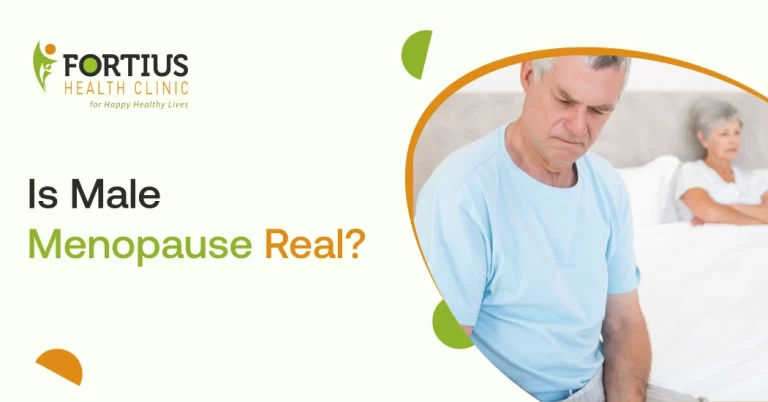
Is Male Menopause Real?
While the concept of male Menopause is widely discussed, there is still some debate about whether it is an actual medical condition. In women, Menopause is when their period (Menstruation cycle) stops, and after that, they will no longer be able to get pregnant. Male Menopause is the idea of a male equivalent to the hormonal changes experienced by women during Menopause. Is male Menopause an actual medical condition or not? Has been the subject of research and discussion within the medical community.
Is Male Menopause Real?
The answer is yes. But not every man experiences male Menopause, and also, there is no fixed age for male Menopause as it can happen at any age period starting from age 30 onwards. Every man can notice the symptoms as the symptoms are real.
What is Male Menopause?
Male Menopause, also known as andropause, refers to the gradual decline in testosterone levels that occurs as men age. Unlike the dramatic hormonal shift experienced by women during Menopause, the changes in men tend to be more gradual and less pronounced.
The primary hormone affected is testosterone , crucial in maintaining muscle mass, bone density, sexual function, and overall energy levels. As men age, typically starting around the age of 40, their testosterone levels begin to drop by about 1% per year. This gradual decline can lead to a range of symptoms that are often associated with male Menopause.
Difference between menopause and andropause
| Menopause (Female) | Andropause (Male) |
| The time in a woman’s life where her periods (menstruation cycle) stop | The time in a man’s life when his testosterone levels sharply decline is known as the andropause. |
| A woman enters menopause 12 months after her last menstrual cycle. At the age of (45- 55) | There is no time period. Men may face andropause any time above the age of 30. |
| Every women face Menopause | Not every men face andropause |
| Menopause symptoms are Irregular periods, Vaginal dryness, Hot flashes, Chills, Night sweats, Sleep problems, Mood changes, Weight gain and slowed metabolism | Andropause symptoms are loss of muscle mass, reduced ability to exercise,mood swing, fat redistribution, lack of enthusiasm or energy, difficulty sleeping (insomnia), or increased tiredness. |
Symptoms of Male Menopause
The symptoms of male Menopause can vary widely from individual to individual, and the severity of the symptoms can also differ. The most typical signs and symptoms of andropause are
Decreased sex drive
One of the most notable symptoms of male Menopause is a decline in sexual desire and function. This can be caused by the drop in testosterone levels, which plays a crucial role in sexual arousal and performance.
Erectile dysfunction
Along with a decreased sex drive, some men may experience difficulty achieving or maintaining an erection, known as erectile dysfunction.
Fatigue and decreased energy levels
As testosterone levels drop, men may experience a general sense of fatigue and a lack of energy, making it challenging to maintain their usual physical and mental activity.
Mood changes
Hormonal fluctuations can lead to mood swings, irritability, and even depression in some men experiencing andropause.
Decreased muscle mass and strength
Testosterone is essential for maintaining muscle mass and strength. As levels decline, men may notice a gradual loss of muscle tone and strength.
Increased body fat
With the decrease in muscle mass and the drop in testosterone, some men may experience an increase in body fat, particularly around the midsection.
Cognitive changes
Some men report experiencing difficulty with memory, concentration, and problem-solving, which may be related to the changes in hormone levels.
Diagnosis of Male Menopause
Diagnosing male Menopause can be a complex process, as the symptoms can be similar to those associated with other health conditions. To confirm a diagnosis, healthcare providers may perform a series of tests, including
1. Blood tests: Measuring testosterone levels and other hormones can help determine if a man is experiencing a decline in testosterone.
2. Physical examination: A physical exam can help identify any underlying health issues contributing to the symptoms.
3. Questionnaires: Healthcare providers may use questionnaires to assess the severity of the symptoms and their impact on a man’s quality of life.
Treatment Options For Male Menopause
1. Testosterone replacement therapy (TRT): This is the primary treatment for male Menopause. TRT involves the administration of synthetic testosterone, either through injections, patches, gels, or implants, to restore the body’s hormone levels.
2. Lifestyle changes: Adopting a healthier lifestyle, including regular exercise, a balanced diet, and stress management techniques, can help alleviate some of the symptoms associated with male Menopause.
3. Medications: In some cases, healthcare providers may prescribe medications to address specific symptoms, such as erectile dysfunction or mood changes.
4. Counseling and support: Seeking support from a mental health professional can be beneficial for men experiencing the emotional and psychological impacts of male Menopause.
It’s important to note that the treatment approach will be tailored to the individual’s specific needs and the severity of their symptoms.
Takeaway
Men usually experience a decline in testosterone levels as they age. Every man does not experience andropause. The drop in testosterone levels can be brought up by lifestyle changes, diet, and workouts in most men. Consult with a sexologist if the symptoms are causing difficulties. Also, it’s important to get enough laughter and a stress-free lifestyle to avoid male Menopause and keep your testosterone levels up to the mark.
FAQs
Male menopause, often referred to as andropause, is not a distinct phase like female menopause. It involves a gradual decline in testosterone levels, typically starting around age 40 and continuing over several decades. The duration varies, but symptoms can persist for years as hormone levels decrease gradually.
Yes, there is a male equivalent to menopause known as andropause or late-onset hypogonadism. This condition is characterized by a gradual decrease in testosterone levels in aging men, leading to symptoms such as fatigue, mood changes, and reduced libido. However, it is not as universally experienced as menopause in women.
Male menopause generally begins around the age of 40, although the decline in testosterone can start as early as the late 30s. Unlike female menopause, which occurs abruptly, testosterone levels decrease gradually, averaging about 1% per year after age 30. Not all men will experience significant symptoms during this time.
The main difference between menopause and andropause lies in the hormonal changes. Menopause involves a sharp decline in estrogen and progesterone, leading to the end of reproductive capability. In contrast, andropause features a gradual decrease in testosterone, allowing men to retain reproductive ability even at lower hormone levels. While menopause in women is a well-defined biological event, andropause is not universally recognized as such. Symptoms associated with andropause, including fatigue, mood swings, and decreased libido, can vary significantly among men. The gradual nature of testosterone decline means that not all men will experience the same symptoms or severity.






